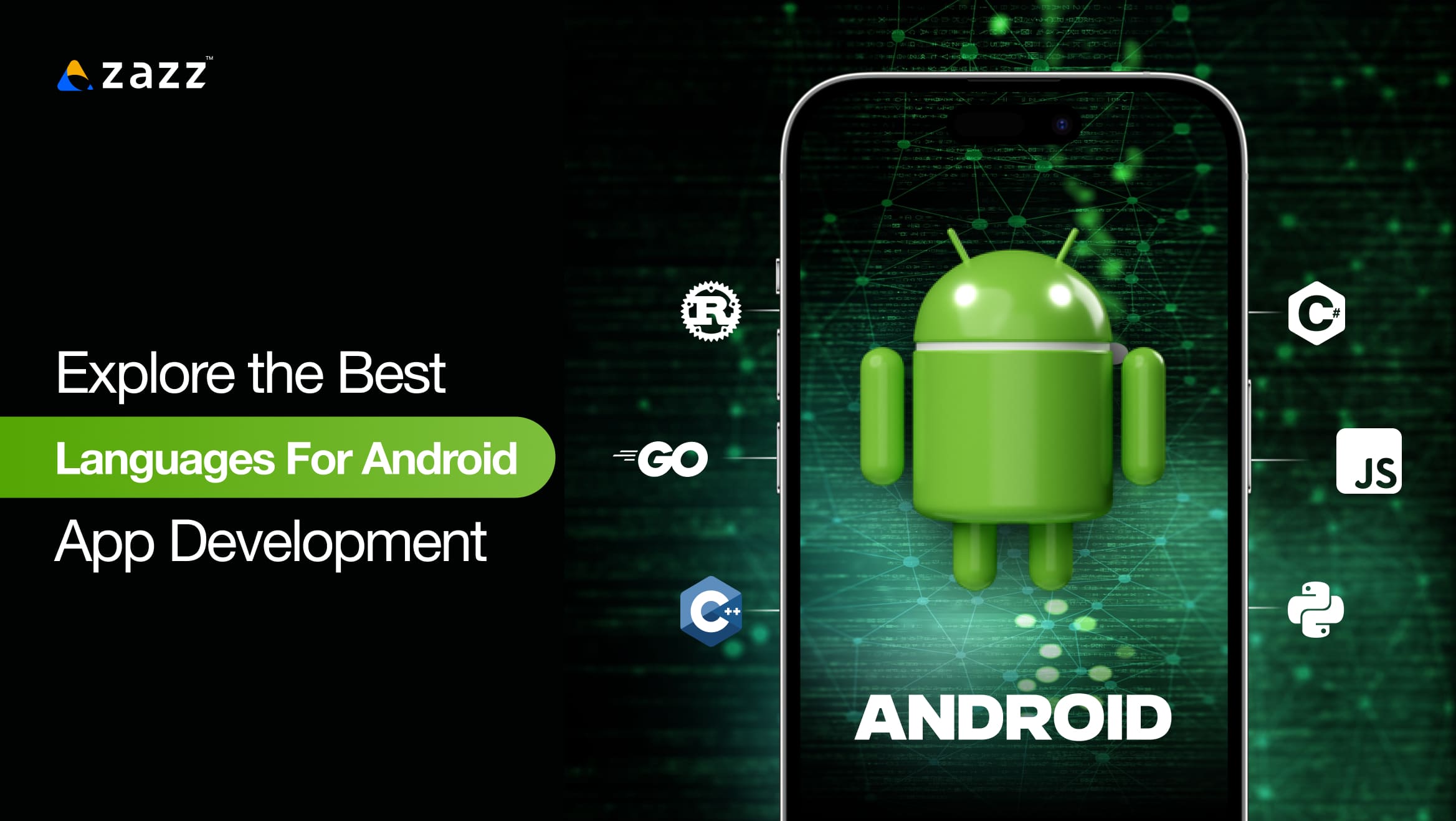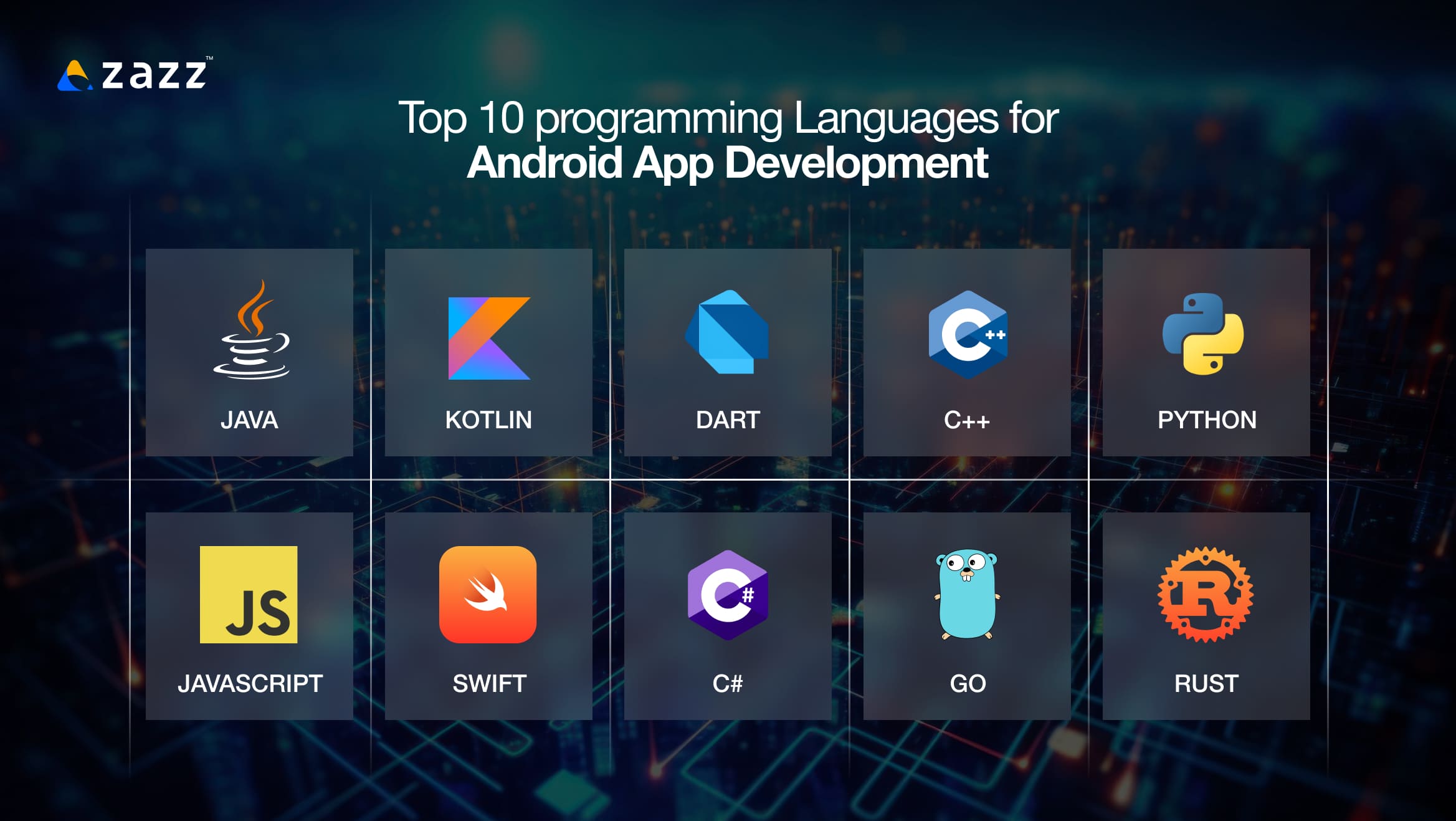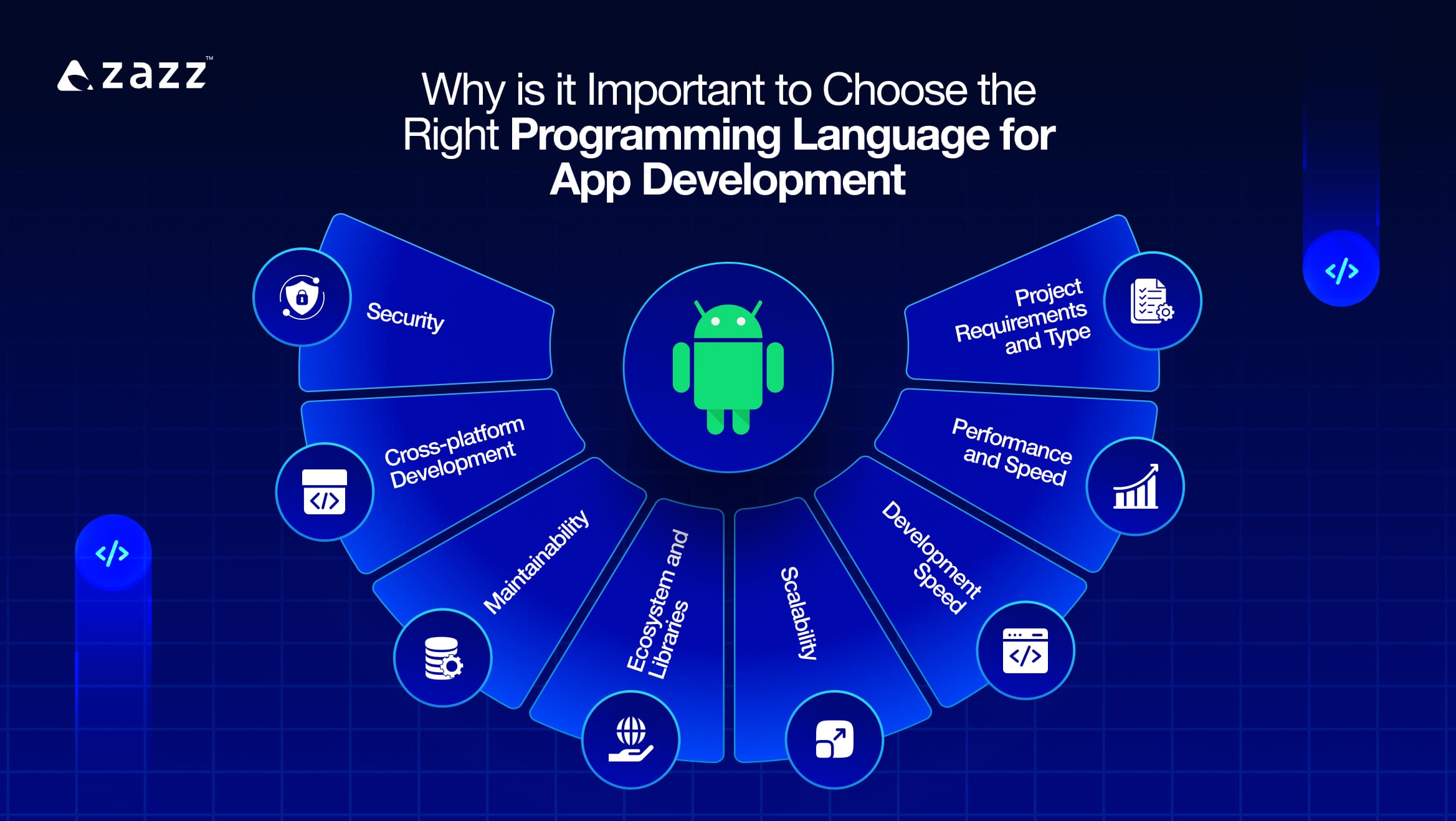
Android app development has evolved tremendously over the years, with developers choosing from a variety of programming languages. The rise of mobile applications in every sector of society has made Android a dominant player in the global mobile market. As of 2025, the tools, technologies, and languages for Android app development have grown more diverse, providing developers with greater flexibility to create apps that cater to a wide range of user needs.
When it comes to Android app development, selecting the right programming language is crucial. The performance, scalability, and maintainability of an Android app depend largely on the language used for Android app development. The language should align with the app’s complexity, features, and desired platform. With the increasing demand for mobile applications, understanding which Android app programming languages will be most beneficial in 2025 is essential for every developer.
In this blog, we will explore the top 10 programming languages outlining their benefits, use cases, and why they remain prominent choices for developers.
Top 10 programming Languages for Android App Development

1. Java
Java has long been the android application development language of choice. It remains one of the most popular languages for Android app development, thanks to its rich set of libraries, strong community support, and scalability. As one of the official languages used by Google for Android development, Java offers a comprehensive and mature ecosystem for building apps.
Why choose Java?
- Wide community support: Java has a massive developer community, meaning plenty of resources and tutorials are available for developers.
- Platform Independence: Java follows the “write once, run anywhere” principle, which makes it an ideal choice for cross-platform development.
- Scalability: Java apps are robust and can scale to accommodate larger and more complex applications.
In 2025, Java will continue to be one of the best languages for Android app development, especially for developers familiar with object-oriented programming.
2. Kotlin
Kotlin, a relatively newer language introduced by JetBrains, has gained tremendous traction in the Android development world. In 2017, Google officially endorsed Kotlin as the preferred android programming language for Android development. By 2025, Kotlin has established itself as a top language for Android app development, offering a range of features that make it developer-friendly and efficient.
Why choose Kotlin?
- Concise Syntax: Kotlin’s syntax is more concise than Java, which helps reduce boilerplate code.
- Interoperability: Kotlin is fully interoperable with Java, meaning developers can use Kotlin alongside Java code in the same project.
- Null Safety: One of Kotlin’s most significant features is its built-in null safety, which helps prevent null pointer exceptions, one of the most common errors in Android development.
Kotlin’s growing popularity and efficiency make it one of the best programming languages for Android app development in 2025.
3. Dart (with Flutter)
Dart is the programming language used for developing applications with Flutter, a UI toolkit created by Google. While Dart is not as popular as Java or Kotlin, it has emerged as one of the most important languages for Android app development due to the success of Flutter.
Why choose Dart?
- Cross-platform capabilities: Dart, when used with Flutter, allows developers to write code once and deploy it on both Android and iOS, which significantly reduces development time.
- Rich UI capabilities: Flutter’s UI toolkit is known for creating highly customizable and responsive UIs.
- Strong performance: Dart compiles to native code, which results in improved performance compared to traditional JavaScript-based mobile frameworks.
For developers focused on building cross-platform applications with seamless user interfaces, Dart and Flutter development are excellent choices for android mobile app development in 2025.
Related reading: Revamp Your Business Model With Android App Development Guide
4. C++
C++ is a powerful, object-oriented programming language that has been widely used for Android app development, especially for performance-intensive applications. Though not as common as Java or Kotlin for standard Android development, C++ is the preferred android app making language for games or apps that require heavy computational processing.
Why choose C++?
- High performance: C++ offers the highest level of performance among android app programming languages, making it ideal for resource-heavy apps like games and 3D rendering.
- Native Development: With C++, you can use the Android NDK (Native Development Kit) to directly interact with the Android platform for better performance.
- Extensive Libraries: C++ has a wide range of libraries, which allows developers to optimize apps for high-performance computing.
If your project involves game development or highly performance-demanding applications, C++ remains an essential android mobile app development language in 2025.
5. Python
Python is a general-purpose programming language that is simple and easy to learn. Although it’s not traditionally associated with Android app development, Python has gained traction in the mobile app development space due to its simplicity and versatility. There are tools like Kivy and BeeWare that allow developers to use Python for Android development.
Why choose Python?
- Simplicity and readability: Python’s syntax is clean and easy to understand, making it a great choice for beginners.
- Rapid development: Python allows for quick prototyping, which helps speed up the development process.
- Versatility: Python is also used for web development, data analysis, and AI, so developers can easily transition between projects.
Though not one of the best languages for Android app development in a traditional sense, Python is growing in popularity due to its ease of use and versatility.
6. JavaScript (with React Native)
JavaScript has always been a dominant force in web development, and in recent years, it has made its way into the world of mobile app development through frameworks like React Native. React Native, a framework created by Facebook, allows developers to use JavaScript to build cross-platform mobile apps for both Android and iOS.
Why choose JavaScript with React Native?
- Cross-platform development: Like Dart with Flutter, React Native allows developers to build apps for both Android and iOS from a single codebase.
- Large community support: JavaScript and React Native have large, active communities, which provide ample resources, tutorials, and open-source libraries.
- Performance: React Native uses native components, making it almost as fast as a native Android application.
For developers looking for a cross-platform solution with the flexibility of JavaScript, React Native is one of the most effective android app programming languages in 2025.
7. Swift (with Kotlin/Native)
While Swift is primarily associated with iOS app development, it has found a way into Android development via Kotlin/Native. This technology enables Swift to run on Android alongside Kotlin code. Swift has a growing presence in the mobile development ecosystem, especially for cross-platform development when paired with Kotlin/Native.
Why choose Swift with Kotlin/Native?
- Unified codebase: With Kotlin/Native, developers can write Swift code and run it on both iOS and Android.
- Interoperability: Swift can be used in conjunction with Kotlin, combining the strengths of both languages.
- Performance: Swift is known for its speed and efficiency, making it an ideal choice for performance-critical applications.
Swift is not traditionally a go-to android app development language, but its use with Kotlin/Native provides a unique option for developers working on cross-platform projects.
8. C# (with Xamarin)
C# is another powerful programming language that can be used for Android app development through Xamarin, a cross-platform development framework. Xamarin allows developers to write Android apps using C# and share code across Android, iOS, and other platforms.
Why choose C# with Xamarin?
- Cross-platform development: Xamarin provides an excellent way to develop cross-platform applications with a single C# codebase.
- Strong IDE support: Xamarin integrates seamlessly with Visual Studio, making development more streamlined.
- Performance: Xamarin allows developers to write high-performance applications by compiling code to native binaries.
C# with Xamarin continues to be one of the most popular languages for Android app development for developers who are comfortable working with the Microsoft ecosystem.
9. Go
Go (also known as Golang) is a statically typed language developed by Google. While not as commonly used in Android app development as Java or Kotlin, Go is becoming more popular, especially for backend development. For Android apps that rely heavily on cloud-based features, Go can be a great choice.
Why choose Go?
- Concurrency: Go is designed for handling multiple tasks simultaneously, making it a great option for apps with real-time data processing or cloud-based features.
- Performance: Go is fast and efficient, with the ability to compile into machine code, making it suitable for high-performance tasks.
- Simplicity: Go’s syntax is simple, allowing developers to quickly get up to speed and build reliable applications.
While Go is still a relatively niche choice for Android app development, it is gaining popularity, particularly for backend services in modern Android apps.
10. Rust
Rust is a systems programming language that is gaining traction in Android development, especially when performance and security are the top priorities. Rust’s memory safety features make it an excellent choice for developers working on low-level system components or other performance-critical aspects of Android apps.
Why choose Rust?
- Memory safety: Rust’s memory safety features prevent common issues like null pointer dereferencing, buffer overflows, and data races, which are often problematic in languages like C and C++.
- Concurrency: Rust is designed for concurrent programming, allowing developers to take full advantage of multi-core processors.
- Performance: Rust is one of the fastest languages available, making it ideal for building performance-intensive Android applications.
Rust is still emerging as one of the android mobile app development languages, but it shows great promise for certain applications, especially those requiring high levels of performance and safety.
Related reading: Redefine Mobile Applications by Features of Android 11
Why is it Important to Choose the Right Programming Language for App Development & How to do it?

Choosing the right programming language for app development is crucial for several reasons, as it impacts the efficiency, performance, and overall success of the project. Here’s why it’s important:
1. Project Requirements and Type
- Platform-specific needs: Some programming languages are more suited for specific platforms, like Swift for iOS or Kotlin for Android. Choosing the correct language ensures the app works seamlessly on the intended device.
- App type: The language chosen can affect the performance and functionality. For instance, if you need high-performance graphics (e.g., gaming apps), languages like C++ or Unity (C#) may be more suitable.
2. Performance and Speed
- The performance of your app depends heavily on the language chosen. For resource-intensive applications (e.g., gaming, real-time apps), selecting a language like C++ or Rust might offer superior speed and efficiency.
- Languages like JavaScript or Python might not offer the same level of performance for heavy computations or real-time interactions.
3. Development Speed
- Some programming languages and frameworks have more extensive libraries, frameworks, and tools that allow for faster development. For example, languages like Python or JavaScript offer a lot of pre-built solutions, making development quicker.
- If you’re working with tight deadlines or limited resources, choosing a language with a higher level of abstraction or strong community support can help reduce development time.
4. Scalability
- The language you choose needs to support future growth in terms of user base and functionality. Languages like Java, C#, or Python are known for their scalability, while others might limit your app’s ability to expand efficiently.
5. Ecosystem and Libraries
- A rich ecosystem of libraries and frameworks can drastically reduce the amount of work you need to do from scratch. Languages with a robust ecosystem (e.g., JavaScript with React Native, or Python with Django/Flask) can be more beneficial as they provide reusable components and tools.
6. Maintainability
- Some languages are easier to maintain than others. For example, languages with clean, readable syntax (like Python) or robust error-handling features (like Java) may make it easier to update and debug the app over time.
7. Cross-platform Development
- If you want your app to work across multiple platforms (iOS, Android, Web), using a cross-platform development framework like Flutter (Dart) or React Native (JavaScript) can save time and effort. Choosing the right language for cross-platform development is essential for reducing the complexity of maintaining separate codebases.
8. Cost and Resource Availability
- The availability of skilled developers in a specific language can affect the cost and timeline of the project. Some languages have a larger talent pool and more resources available, making it easier and cheaper to find developers.
- Moreover, some languages may have open-source tools that reduce the cost of app development, while others may require expensive proprietary software.
9. Security
- Security is an essential concern in app development. Some programming languages offer more built-in security features than others. For example, languages like Java and Swift have better memory management and security features, which can prevent common vulnerabilities like buffer overflow.
10. Future-proofing
- You want your app to be maintainable in the long run. The future of the chosen programming language and its community support is vital. Opting for a language with strong future growth (such as Python, JavaScript, or Swift) ensures your app remains relevant and supported as technologies evolve.
The choice of programming language affects every aspect of your app’s development, including performance, scalability, cost, and long-term success. Therefore, it’s crucial to carefully evaluate the project’s needs, the language’s strengths, and the availability of resources before making a decision.
Related reading: Android App Development Cost Breakdown
Conclusion
Choosing the right android programming language is essential for building high-performance, scalable, and maintainable Android applications. As of 2025, the languages for Android app development are more diverse than ever. Whether you are developing a simple mobile app or a complex, resource-intensive application, there is a programming language that fits your needs.
For many developers, Kotlin remains the best programming language for Android app development, offering a perfect balance of conciseness, null safety, and interoperability with Java. However, other languages for Android app development like Java, Dart (with Flutter), and C++ continue to play vital roles in the Android development ecosystem. Emerging languages for Android app development like Go and Rust also offer compelling advantages for specific use cases.
Ultimately, the choice of an android app programming language will depend on the project requirements, performance expectations, and the developer’s familiarity with the language. By staying updated on the latest trends in android app development languages, developers can ensure they are equipped with the best tools for creating cutting-edge mobile applications.
Get your android app developed by the top app development experts at Zazz. Get in touch with the team today.
Frequently Asked Questions
In 2025, some of the best languages for Android app development include Kotlin, Java, Dart (with Flutter), and C++. Kotlin remains the best programming language for Android app development due to its conciseness, null safety, and interoperability with Java. Java continues to be a strong choice due to its extensive ecosystem and community support. Dart with Flutter is growing in popularity for cross-platform development, and C++ is the go-to language for performance-heavy applications like games.
Kotlin is widely regarded as one of the best languages for Android app development because it offers several advantages over Java. Its syntax is more concise, reducing boilerplate code, and it is fully interoperable with Java. Additionally, Kotlin has built-in null safety, which significantly reduces the chances of runtime errors like null pointer exceptions. As a result, Kotlin has become the android programming language of choice for developers aiming to build efficient and safe Android apps.
The most commonly used android application development language is Java. Java has been the backbone of Android development for years, offering a mature ecosystem, extensive libraries, and strong community support. Even though Kotlin is now officially supported by Google, Java remains a popular choice due to its long history in Android app development and its scalability for large applications.
For performance-heavy applications, C++ is the preferred android app making language. It offers the highest level of performance among Android programming languages, making it ideal for applications like games or those requiring complex computations. Developers can use C++ in conjunction with the Android NDK (Native Development Kit) for low-level programming that directly interacts with the hardware, ensuring optimal performance.
Dart, when used with the Flutter framework, has become a significant android mobile app development language. Dart enables developers to write cross-platform applications that work on both Android and iOS from a single codebase. This ability reduces development time and provides a consistent UI experience across platforms. Dart’s use with Flutter makes it one of the most promising languages for Android app development for developers focusing on building fast, high-quality mobile apps.
Yes, Go and Rust are emerging languages for Android app development in 2025. Go is gaining popularity for backend services in Android apps, particularly for apps that rely on cloud infrastructure, due to its simplicity and efficiency in handling concurrent tasks. Rust, known for its memory safety and high performance, is also becoming a android mobile app development language for building security-sensitive and performance-intensive apps, offering a new alternative for developers working on low-level system components.
Recent Articles
Table of Content 1. Data Engineer vs. Data Scientist: Understanding...
Table of Content 1. What is the Carnival in Brazil?...
Table of Content 1. What is IT Staff Augmentation? 2....












